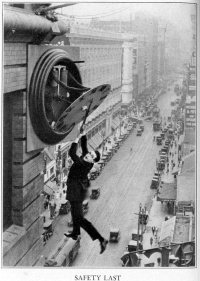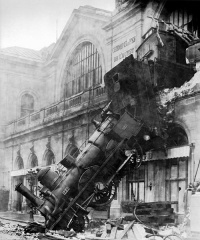Accident
From The Art and Popular Culture Encyclopedia
| Revision as of 07:40, 23 April 2007 WikiSysop (Talk | contribs) ← Previous diff |
Current revision Jahsonic (Talk | contribs) |
||
| Line 1: | Line 1: | ||
| + | [[Image:Harold Lloyd clutching the hands of a large clock as he dangles from the outside of a skyscraper above moving traffic.jpg |thumb|left|200px| | ||
| + | [[Harold Lloyd clutching the hands of a large clock as he dangles from the outside of a skyscraper above moving traffic]]]] | ||
| + | {| class="toccolours" style="float: left; margin-left: 1em; margin-right: 2em; font-size: 85%; background:#c6dbf7; color:black; width:30em; max-width: 40%;" cellspacing="5" | ||
| + | | style="text-align: left;" | | ||
| + | "Since the [[epiphenomenon]] is often equated with the [[accident]], [['Pataphysics|pataphysics]] will be above all the science of the [[particular]], even though it is said that science deals only with the [[generalization|general]]." --''[[Exploits and Opinions of Dr. Faustroll, Pataphysician ]]'' (1911) by Alfred Jarry | ||
| + | <hr> | ||
| + | "The phrase "[[accident]] as unworthy of determining our [[fate]]" (Zufall unwürdig für unser Schicksal) in Freud's "[[Leonardo da Vinci, A Memory of His Childhood]]" (1910) is somewhat central to [[Richard Rorty]]'s ''[[Contingency, Irony, and Solidarity]]'' (1989)."--Sholem Stein | ||
| + | |} | ||
| + | [[Image:Train wreck at Montparnasse 1895.jpg|thumb|right|200px|''[[Train wreck at Montparnasse]]'' ([[October 22]], [[1895]]) by Studio Lévy and Sons]] | ||
| {{Template}} | {{Template}} | ||
| - | [http://en.wikipedia.org/wiki/{{PAGENAMEE}}] [Apr 2007] | + | An '''accident''' is a [[detrimental]] [[event]] that occurs [[unexpected]]ly and [[unintentional]]ly. Physical examples include unintended [[Crash|collisions]] or [[falling|falls]], being injured by [[touch|touching]] something sharp, hot, or [[electric]], or ingesting poison. Non-physical examples are unintentionally revealing a [[secret]] or otherwise saying something incorrectly, [[forgetting]] an appointment, etc. |
| + | |||
| + | ==Freak accident== | ||
| + | An [[incident]], especially one that is [[harmful]], occurring under highly [[unusual]] and [[unlikely]] [[circumstance]]s. | ||
| + | |||
| + | The informal term "freak accident" may refer to an [[unfortunate]] [[event]] that may seem exceedingly unlikely to happen by chance. This term may be used to imply doubts about whether the event actually was an [[accident]]. An example of a freak accident is the death of [[Isadora Duncan]] who died of accidental [[strangulation]] and [[cervical fracture|broken neck]] when one of the long [[scarf|scarves]] she was known for caught on the wheel of a [[automobile|car]] in which she was a passenger. | ||
| + | ==Etymology== | ||
| + | Latin ''accidēns'', present active participle of ''accidō'' (“happen”); from ''ad'' (“to”) + ''[[cadō]]'' (“fall”). See ''[[cadence]]'', ''[[case]]''. | ||
| + | ==Dicta== | ||
| + | *[[There is no science of the accident]] | ||
| + | == See also == | ||
| + | |||
| + | *[[Accidentalism]] | ||
| + | *[[Bad luck]] | ||
| + | *[[Crash]] | ||
| + | * The [[integral accident]] | ||
| + | * [[Divine accident]] | ||
| + | * "[[The Art of the Accident: Paul Virilio and Accelerated Modernity]]", a text by Steve Redhead | ||
| + | *[[List of unusual deaths]] | ||
| + | *[[Unnatural death]] | ||
| + | *[[Disaster]] | ||
| + | * [[Injury]] | ||
| + | * [[Safety]] | ||
| + | * [[Traffic collision]] | ||
| + | {{GFDL}} | ||
Current revision
|
"Since the epiphenomenon is often equated with the accident, pataphysics will be above all the science of the particular, even though it is said that science deals only with the general." --Exploits and Opinions of Dr. Faustroll, Pataphysician (1911) by Alfred Jarry "The phrase "accident as unworthy of determining our fate" (Zufall unwürdig für unser Schicksal) in Freud's "Leonardo da Vinci, A Memory of His Childhood" (1910) is somewhat central to Richard Rorty's Contingency, Irony, and Solidarity (1989)."--Sholem Stein |
|
Related e |
|
Featured: |
An accident is a detrimental event that occurs unexpectedly and unintentionally. Physical examples include unintended collisions or falls, being injured by touching something sharp, hot, or electric, or ingesting poison. Non-physical examples are unintentionally revealing a secret or otherwise saying something incorrectly, forgetting an appointment, etc.
Contents |
Freak accident
An incident, especially one that is harmful, occurring under highly unusual and unlikely circumstances.
The informal term "freak accident" may refer to an unfortunate event that may seem exceedingly unlikely to happen by chance. This term may be used to imply doubts about whether the event actually was an accident. An example of a freak accident is the death of Isadora Duncan who died of accidental strangulation and broken neck when one of the long scarves she was known for caught on the wheel of a car in which she was a passenger.
Etymology
Latin accidēns, present active participle of accidō (“happen”); from ad (“to”) + cadō (“fall”). See cadence, case.
Dicta
See also
- Accidentalism
- Bad luck
- Crash
- The integral accident
- Divine accident
- "The Art of the Accident: Paul Virilio and Accelerated Modernity", a text by Steve Redhead
- List of unusual deaths
- Unnatural death
- Disaster
- Injury
- Safety
- Traffic collision



